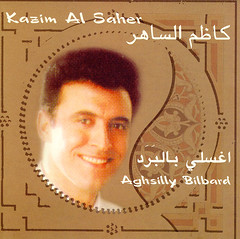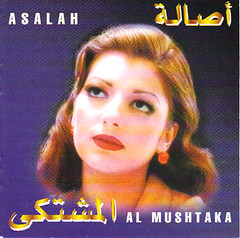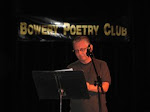I found this CD many years ago, in the late 90s or early 00s, at a Syrian grocery store on 5th Avenue and 15th Street in Park Slope Brooklyn. Until I left Park Slope in late 2001 it was my favorite go-to place for Arabic pop--their selection was decent, if not exactly exhaustive, and the CDs were cheap: $5 a piece, or 5 for $20. Plus, the woman who ran the store was incredibly nice and, every time I stopped by, she'd make recommendations and quiz me on whatever she happened to be playing:
"You know who this is, right?"
"Umm, yeah ... Oum Kalsoum?"
"Very good! But, which song is it?"
She had a teenage daughter who hung out with her and, whenever I asked about this or that CD, if she didn't know the music herself, she'd ask her daughter if it was any good. I remember her daughter nodding emphatically if she liked this particular CD, Bethib Meen, by Egyptian superstar Angham.
Born into a creative family, Angham started her singing career under the wing of her father, who was a violin player and music producer. Bethib Meen, which came out in 1997, was the last CD she recorded with any help from her father. After 2001, her music became increasingly westernized.
Egyptian pop--or more specifically what I like to call, in this instance, Egyptian art pop--is some of the strangest music in the world. It has solid roots in classical Arabic music, but with tinges of western and other influence. In this CD, for instance, I swear to god, you'll hear ELO. (Yes, I mean the Electric Light Orchestra. Listen to the clip below if you don't believe me.)
Angham's voice is exquisite; there's a reason she is the most popular Egyptian female singer to have begun a career in the 80s. It had been, I admit, years since I'd listened to Bethib Meen, but when I was combing my shelves for something to post tonight after work, I pulled it down, gave it a listen, and was surprised at how terrific--and odd--it is. If you're new to Angham, or if you only know her work after 2001, I highly recommend giving this album a listen.
Listen to "Sallam Alay"

































.jpg)









%20-18%2047.jpg)





























































.jpg)


































